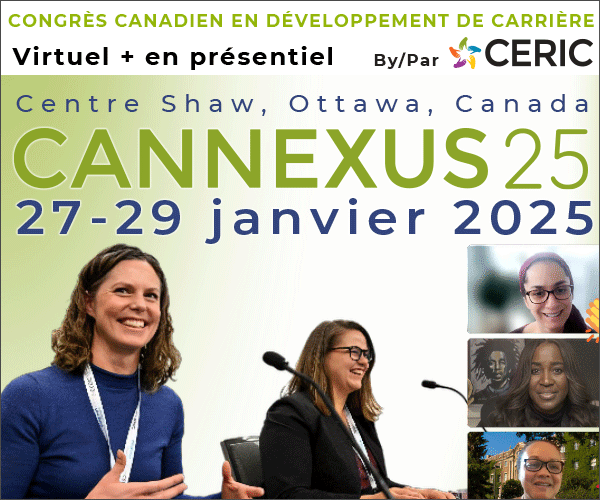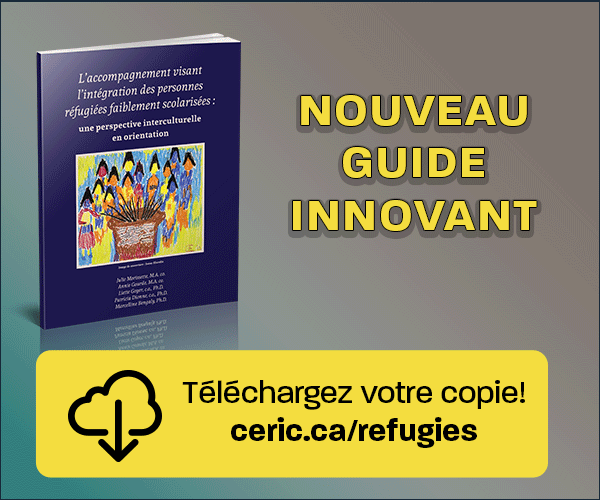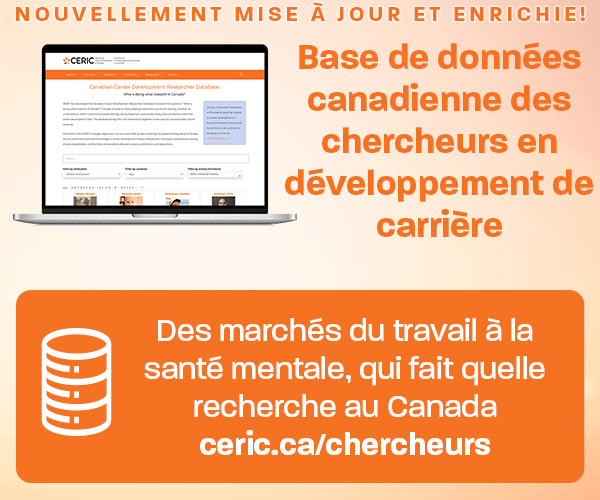Les retraités paient pour l'avenir : un programme de mentorat entre retraités et professeurs
DOI :
https://doi.org/10.53379/cjcd.2024.372Mots-clés :
Mentorat, Mentors retraités, Les mentorés à travers le continuum de carrière, Développement professionnel, La relation de mentoratRésumé
Les retraités ont souvent le désir d'offrir des contributions significatives à leur communauté universitaire après avoir pris leur retraite. Cet article présente les résultats d'une étude pilote d'un programme de mentorat en développement de carrière à plusieurs composantes, menée dans un établissement postsecondaire canadien. Dans le cadre de cette étude, des professeurs retraités ont servi de mentors à des professeurs issus de l'ensemble du continuum de la carrière universitaire. Une approche d'étude de cas informée par Merriam a été utilisée pour délimiter l'étude du programme de mentorat à composantes multiples, et l'analyse des données a été guidée par des processus établis d'analyse thématique réflexive (AT), une méthode d'engagement analytique systématique avec des données qualitatives pour produire des thèmes.
Références
Allen, T. D. (2007). Mentoring Relationships from the Perspective of the Mentor. In B. R. Ragins & K. E. Kram (Eds.), The Handbook of Mentoring at Work: Theory, Research, and Practice (pp. 123). SAGE Publications, Inc. https://doi.org/10.4135/9781412976619.n5
Allen, T. D., Eby, L. T., Poteet, M. L., Lentz, E., & Lima, L. (2004). Career Benefits Associated With Mentoring for Protégés: A Meta-Analysis. Journal of applied psychology, 89(1), 127-136. https://doi.org/10.1037/0021-9010.89.1.127
Alves, P. C., Oliveira, A. d. F., & Paro, H. B. M. d. S. (2019). Quality of life and burnout among faculty members: How much does the field of knowledge matter? PloS one, 14(3), e0214217-e0214217. https://doi.org/10.1371/journal.pone.0214217
Bean, N. M., Lucas, L., & Hyers, L. L. (2014). Mentoring in higher education should be the norm to assure success: Lessons learned from the faculty mentoring program, West Chester University, 2008-2011. . Mentoring & Tutoring: Partnership in Learning, 22(1), 56-73. https://doi.org/https://doi.org/10.1080/13611267.2014.882606
Blake-Beard, S. D., O’Neill, R. M., & McGowan, E. M. (2008). “Blind Dates?: The Importance of Matching in Successful Formal Mentoring Relationships” In B. R. R. K. E. Kram (Ed.), The Handbook of Mentoring at Work: Theory, Research, and Practice (pp. 617). SAGE Publications, Inc. https://doi.org/10.4135/9781412976619.n25
Bozeman, B., & Feeney, M. K. (2007). Toward a Useful Theory of Mentoring: A Conceptual Analysis and Critique. Administration & society, 39(6), 719-739. https://doi.org/10.1177/0095399707304119
Braun, V., & Clarke, V. (2006). Using thematic analysis in psychology. Qualitative research in psychology, 3(2), 77-101. https://doi.org/10.1191/1478088706qp063oa
Braun, V., & Clarke, V. (2022a). Conceptual and design thinking for thematic analysis. Qualitative psychology (Washington, D.C.), 9(1), 3-26. https://doi.org/10.1037/qup0000196
Braun, V., & Clarke, V. (2022b). Toward good practice in thematic analysis: Avoiding common problems and be(com)ing a knowing researcher. International journal of transgender health, 1-6. https://doi.org/10.1080/26895269.2022.2129597
Cranmer, J. M., Scurlock, A. M., Hale, R. B., Ward, W. L., Prodhan, P., Weber, J. L., Casey, P. H., & Jacobs, R. F. (2018). An Adaptable Pediatrics Faculty Mentoring Model. Pediatrics (Evanston), 141(5), 1. https://doi.org/10.1542/peds.2017-3202
Crites, G. E., Ward, W. L., Archuleta, P., Fornari, A., Hill, S. E. M., Westervelt, L. M., & Raymond, N. (2023). A Scoping Review of Health Care Faculty Mentorship Programs in Academia: Implications for Program Design, Implementation, and Outcome Evaluation. The Journal of continuing education in the health professions, 43(1), 42-51. https://doi.org/10.1097/CEH.0000000000000459
Croke, J., Tosoni, S., & Ringash, J. (2021). “It’s good for the soul:” Perceptions of a formal junior faculty mentorship program at a large academic cancer centre. Radiotherapy and oncology, 162, 119-123. https://doi.org/10.1016/j.radonc.2021.07.003
DeCastro, R., Sambuco, D., Ubel, P. A., Stewart, A., & Jagsi, R. (2013). Mentor networks in academic medicine: moving beyond a dyadic conception of mentoring for junior faculty researchers. Academic medicine, 88(4), 488-496. https://doi.org/10.1097/ACM.0b013e318285d302
Donnerwheeler, & Integral Visions Consulting Inc. (2016). Building Successful Mentoring Relationships.
Ebuwei, P. (2020). Mentoring as a Way of Advancing Tenure and Promotion in Higher Education Institutions in the United States: A Systematic Review ProQuest [Dissertations Publishing].
Garvin, T. (2019). The shifting context of academic geography in Canada. The Canadian geographer, 63(3), 405-412. https://doi.org/10.1111/cag.12538
Goldberg, C. E., & Baldwin, R. G. (2018). Win‐Win: Benefits of Expanding Retirement Options and Increasing the Engagement of Retired Faculty and Staff. New directions for higher education, 2018(182), 69-74. https://doi.org/10.1002/he.20281
Hall, J. G. (2017). Reflections on an academic career. Molecular genetics & genomic medicine, 5(3), 187-195. https://doi.org/10.1002/mgg3.298
Hall, J. G. (2021). Continuing contributions of older academics. American journal of medical genetics. Part A, 185(2), 647-657. https://doi.org/10.1002/ajmg.a.61946
Hobson, A. J., Castanheira, P., Doyle, K., Csigás, Z., & Clutterbuck, D. (2016). The Mentoring across Professions (MaP) Project: What can teacher mentoring learn from international good practice in employee mentoring and coaching? .
Jackevicius, C. A., Le, J., Nazer, L., Hess, K., Wang, J., & Law, A. V. (2014). A formal mentorship program for faculty development. American journal of pharmaceutical education, 78(5), 100-100. https://doi.org/10.5688/ajpe785100
Law, A. V., Bottenberg, M. M., Brozick, A. H., Currie, J. D., DiVall, M. V., Haines, S. T., Jolowsky, C., Koh-Knox, C. P., Leonard, G. A., Phelps, S. J., Rao, D., Webster, A., & Yablonski, E. (2014). A checklist for the development of faculty mentorship programs. American journal of pharmaceutical education, 78(5), 98-98. https://doi.org/10.5688/ajpe78598
Martin, J. B., & Douglas, D. H. (2018). Faculty Mentorship: Making It Work Across the Career Continuum Through Development, Implementation, and Evaluation of a Formal Mentorship Program. Nursing education perspectives, 39(5), 317-318. https://doi.org/10.1097/01.NEP.0000000000000310
Mendez, Tygret, J. A., Conley, V. M., Keith, R., Haynes, C., & Gerhardt, R. (2019a). Emeriti faculty as mentors: the benefits and rewards of mentoring the next generation. Mentoring & Tutoring: Partnership in Learning, 27(4), 439-457. https://doi.org/10.1080/13611267.2019.1649921
Mendez, S., Conley, V. M., Tygret, J., Gerhardt, R., & Haynes, C. (2019b). Encore: Retired Faculty as Mentors. Change (New Rochelle, N.Y.), 51(3), 59-61. https://doi.org/10.1080/00091383.2019.1606612
Mendez, S. L., Martin Conley, V., Keith, R. S., Haynes, C., & Gerhardt, R. (2017). Mentorship in the engineering professoriate: exploring the role of social cognitive career theory. International journal of mentoring and coaching in education, 6(4), 302-316. https://doi.org/10.1108/IJMCE-12-2016-0077
Menzin, A. W., Kline, M., George, C., Schindler, J., Yacht, A. C., & Fornari, A. (2020). Toward the Quadruple Aim: Impact of a Humanistic Mentoring Program to Reduce Burnout and Foster Resilience. Mayo Clinic proceedings. Innovations, quality & outcomes, 4(5), 499-505. https://doi.org/10.1016/j.mayocpiqo.2020.05.001
Merriam, S. B., & Tisdell, E. J. (2016). Qualitative research : a guide to design and implementation (Fourth edition. ed.). Jossey-Bass, a Wiley Brand.
Morgan, D. (1997). Focus Groups as Qualitative Research. SAGE Publications Inc.
Pololi, L. H., & Evans, A. T. (2015). Group Peer Mentoring: An Answer to the Faculty Mentoring Problem? A Successful Program at a Large Academic Department of Medicine. The Journal of continuing education in the health professions, 35(3), 192-200. https://doi.org/10.1002/chp.21296
Pope-Ruark, R. (2022). Unraveling faculty burnout: pathways to reckoning and renewal. Johns Hopkins University Press. https://go.exlibris.link/PBLWn4ss
Ragins, B. R. (2016). From the ordinary to the extraordinary. Organizational Dynamics, 45(3), 228-244. https://doi.org/10.1016/j.orgdyn.2016.07.008
Ragins, B. R., & Scandura, T. A. (1999). Burden or blessing? Expected costs and benefits of being a mentor. Journal of organizational behavior, 20(4), 493-509. https://onlinelibrary.wiley.com/doi/10.1002/(SICI)1099-1379(199907)20:4%3C493::AID-JOB894%3E3.0.CO;2-T
Sabagh, Z., Hall, N. C., & Saroyan, A. (2018). Antecedents, Correlates and Consequences of Faculty Burnout. Educational research (Windsor), 60(2), 131-156. https://doi.org/10.1080/00131881.2018.1461573
Sarabipour, S., Hainer, S. J., Arslan, F. N., de Winde, C. M., Furlong, E., Bielczyk, N., Jadavji, N. M., Shah, A. P., & Davla, S. (2021). Building and sustaining mentor interactions as a mentee. The FEBS journal, 289(6), 1374-1384. https://doi.org/10.1111/febs.15823
Silverman, D. (2006). Interpreting qualitative data: Methods for analyzing talk, text, and interaction (3rd ed.). SAGE.
Stalmeijer, R. E., McNaughton, N., & Van Mook, W. N. K. A. (2014). Using focus groups in medical education research: AMEE Guide No. 91. Medical teacher, 36(11), 923-939. https://doi.org/10.3109/0142159X.2014.917165
Strage, A. A. (2018). Bringing Academic Retirement Out of the Closet. New directions for higher education, 2018(182), 29-45. https://doi.org/10.1002/he.20278
Van Ummersen, C. A., McLaughlin, J. M., & Duranleau, L. J. (Eds.). (2014). Faculty Retirement: Best Practices for Navigating the Transition (First ed.). Stylus Publishing, LLC.
Waddell, J., Martin, J., Schwind, J., & Lapum, J. (2017). A Faculty-Based Mentorship Circle: Positioning New Faculty for Success. Canadian journal of higher education (1975), 46(4), 60-75. https://doi.org/10.47678/cjhe.v46i4.186173
Webber, E., Vaughn-Deneen, T., & Anthony, M. (2020). Three-Generation Academic Mentoring Teams: A New Approach to Faculty Mentoring in Nursing. Nurse educator, 45(4), 210-213. https://doi.org/10.1097/NNE.0000000000000777
Yakoboski, P. (2015). Trends and Issues: Understanding the Faculty Retirement (non)Decision. T.-C. Institute. https://www.tiaainstitute.org/sites/default/files/presentations/2017-02/understanding-the-faculty-retirement-nondecision.pdf
Yazan, B. (2015). Three Approaches to Case Study Methods in Education: Yin, Merriam, and Stake. The Qualitative Report, 20(2), 134-152.
Zellers, D. F., Howard, V. M., & Barcic, M. A. (2008). Faculty Mentoring Programs: Reenvisioning Rather than Reinventing the Wheel. Review of educational research, 78(3), 552-588. https://doi.org/10.3102/ 0034654308320966
Zerzan, J. T., Hess, R., Schur, E., Phillips, R. S., & Rigotti, N. (2009). Making the most of mentors: a guide for mentees. Academic medicine, 84(1), 140-144. https://doi.org/10.1097/ACM.0b013e3181906e8f

Téléchargements
Publié-e
Comment citer
Numéro
Rubrique
Licence
(c) Tous droits réservés La Revue canadienne de développement de carrière 2024

Cette œuvre est sous licence Creative Commons Attribution - Pas d'Utilisation Commerciale - Pas de Modification 4.0 International.











